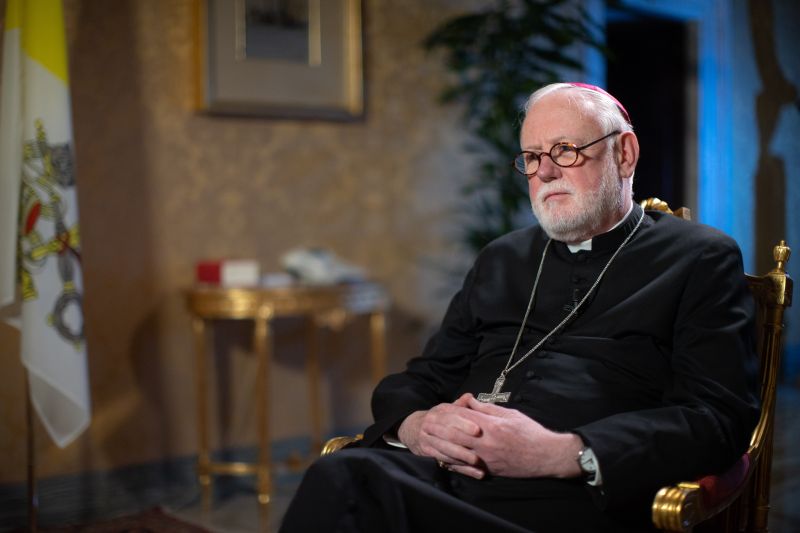 Archbishop Paul Richard Gallagher. / Daniel Ibáñez/CNA
Archbishop Paul Richard Gallagher. / Daniel Ibáñez/CNA
Rome Newsroom, Mar 14, 2023 / 08:54 am (CNA).
The Vatican’s foreign minister has said that the Vatican-China deal was “not the best deal possible” and that negotiations are underway to make the deal “work better.”
In an interview with Colm Flynn for EWTN News, Archbishop Paul Richard Gallagher, the Vatican secretary for Relations with States, said that Holy See diplomats are “negotiating improvements” to the Holy See’s provisional agreement with Beijing on the appointment of bishops, first signed in 2018.
“Obviously, the objective is to get the best deal possible, which certainly this agreement is not the best deal possible because of the other party: They were only prepared to go so far and to agree to certain things. But that was what was possible at the time,” Gallagher said.
“It wasn’t really a great time to sign the deal, for various reasons. It was always going to be difficult; it was always going to be used by the Chinese party to bring greater pressure on the Catholic community, particularly on the so-called underground Church. So we just go forward.”
Gallagher, who was not directly involved in the negotiations, underlined that the agreement with China, which the Vatican has renewed twice in the past five years, was the fruit of a long process under three pontificates.
“And most of the agreement was already agreed and accepted by the Holy See, and by the Chinese authorities already in the time of Pope Benedict,” Gallagher said.
“So it was only a bit of crossing the t’s and dotting the i’s.”
The Holy See diplomat said he believes that the Vatican and Chinese authorities have grown in “a greater understanding, a greater respect” for each other over the years.
“Everything is done obviously in the context of Chinese domestic politics. … And therefore, we can only achieve so much,” he added.
China’s Xi Jinping assumed an unprecedented third term as president last week at a rubber stamp parliamentary session of the National People’s Congress that unanimously voted for Xi in an election in which there was no other candidate.
The National People’s Congress had previously confirmed a constitutional change eliminating term limits granting Xi the possibility of lifelong rule in 2018, six months before the Holy See first signed its deal with Beijing.
Under Xi’s leadership, respect for human rights and religious freedom has deteriorated. Xi has come under mounting international condemnation for China’s brutal persecution of Uyghur Muslims in the northwest Chinese region of Xinjiang, and state officials in different regions of China have removed crosses and demolished church buildings.
In November 2022, the Vatican said that Chinese authorities had violated the terms stipulated in its provision agreement on the appointment of bishops.
A statement released on Nov. 26 said that “the Holy See noted with surprise and regret” that Bishop John Peng Weizhao had been installed as an “auxiliary bishop of Jiangxi,” a diocese that is not recognized by the Vatican.
“The Holy See hopes that similar episodes will not be repeated, remains awaiting appropriate communications on the matter from the authorities, and reaffirms its full readiness to continue the respectful dialogue concerning all matters of common interest,” it said.
In the interview with EWTN, Gallagher confirmed that “there are negotiations underway for the appointment of other bishops.”
“We remain committed to carrying forward that dialogue,” he said.
When asked in the interview what he considers the biggest diplomatic challenges today, Gallagher said that the war in Ukraine, climate change, and conflicts in the Middle East, parts of Africa, and the destabilization of Latin America are the top issues facing the international community.
“But one of the things that the Chinese and the Catholic Church and the Holy See have in common is that we don’t think in months, or even in years. We’re thinking in terms of a much longer time. And we hope that, in time, the relations between the Catholic Church in China will be shall we say much more ‘normal,’ much more fluid, much more fruitful,” he said.
“And as we set off from here, we remain committed, believing that good Catholics can also be good citizens of the People’s Republic of China.”
